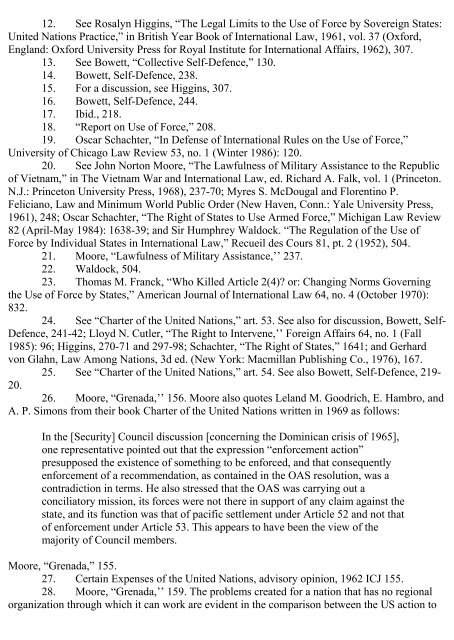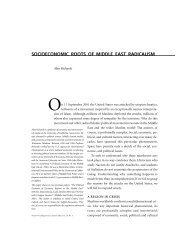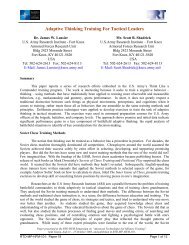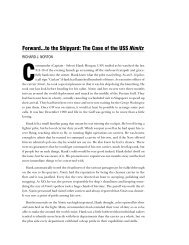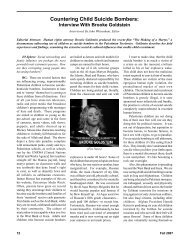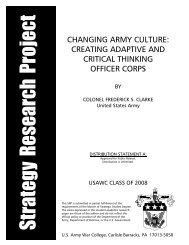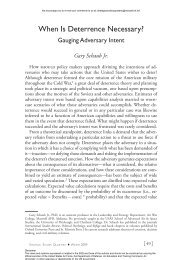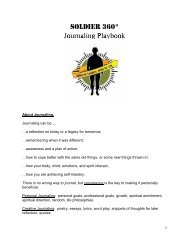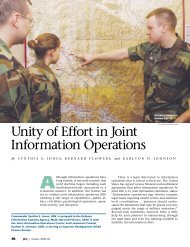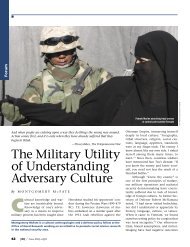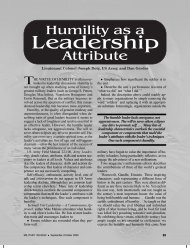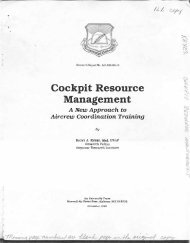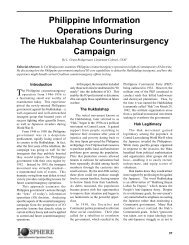Legitimate use of military force against state-sponsored - Air University
Legitimate use of military force against state-sponsored - Air University
Legitimate use of military force against state-sponsored - Air University
Create successful ePaper yourself
Turn your PDF publications into a flip-book with our unique Google optimized e-Paper software.
12. See Rosalyn Higgins, “The Legal Limits to the Use <strong>of</strong> Force by Sovereign States:<br />
United Nations Practice,” in British Year Book <strong>of</strong> International Law, 1961, vol. 37 (Oxford,<br />
England: Oxford <strong>University</strong> Press for Royal Institute for International Affairs, 1962), 307.<br />
13. See Bowett, “Collective Self-Defence,” 130.<br />
14. Bowett, Self-Defence, 238.<br />
15. For a discussion, see Higgins, 307.<br />
16. Bowett, Self-Defence, 244.<br />
17. Ibid., 218.<br />
18. “Report on Use <strong>of</strong> Force,” 208.<br />
19. Oscar Schachter, “In Defense <strong>of</strong> International Rules on the Use <strong>of</strong> Force,”<br />
<strong>University</strong> <strong>of</strong> Chicago Law Review 53, no. 1 (Winter 1986): 120.<br />
20. See John Norton Moore, “The Lawfulness <strong>of</strong> Military Assistance to the Republic<br />
<strong>of</strong> Vietnam,” in The Vietnam War and International Law, ed. Richard A. Falk, vol. 1 (Princeton.<br />
N.J.: Princeton <strong>University</strong> Press, 1968), 237-70; Myres S. McDougal and Florentino P.<br />
Feliciano, Law and Minimum World Public Order (New Haven, Conn.: Yale <strong>University</strong> Press,<br />
1961), 248; Oscar Schachter, “The Right <strong>of</strong> States to Use Armed Force,” Michigan Law Review<br />
82 (April-May 1984): 1638-39; and Sir Humphrey Waldock. “The Regulation <strong>of</strong> the Use <strong>of</strong><br />
Force by Individual States in International Law,” Recueil des Cours 81, pt. 2 (1952), 504.<br />
21. Moore, “Lawfulness <strong>of</strong> Military Assistance,’’ 237.<br />
22. Waldock, 504.<br />
23. Thomas M. Franck, “Who Killed Article 2(4)? or: Changing Norms Governing<br />
the Use <strong>of</strong> Force by States,” American Journal <strong>of</strong> International Law 64, no. 4 (October 1970):<br />
832.<br />
24. See “Charter <strong>of</strong> the United Nations,” art. 53. See also for discussion, Bowett, Self-<br />
Defence, 241-42; Lloyd N. Cutler, “The Right to Intervene,’’ Foreign Affairs 64, no. 1 (Fall<br />
1985): 96; Higgins, 270-71 and 297-98; Schachter, “The Right <strong>of</strong> States,” 1641; and Gerhard<br />
von Glahn, Law Among Nations, 3d ed. (New York: Macmillan Publishing Co., 1976), 167.<br />
25. See “Charter <strong>of</strong> the United Nations,” art. 54. See also Bowett, Self-Defence, 219-<br />
20.<br />
26. Moore, “Grenada,’’ 156. Moore also quotes Leland M. Goodrich, E. Hambro, and<br />
A. P. Simons from their book Charter <strong>of</strong> the United Nations written in 1969 as follows:<br />
In the [Security] Council discussion [concerning the Dominican crisis <strong>of</strong> 1965],<br />
one representative pointed out that the expression “en<strong>force</strong>ment action”<br />
presupposed the existence <strong>of</strong> something to be en<strong>force</strong>d, and that consequently<br />
en<strong>force</strong>ment <strong>of</strong> a recommendation, as contained in the OAS resolution, was a<br />
contradiction in terms. He also stressed that the OAS was carrying out a<br />
conciliatory mission, its <strong>force</strong>s were not there in support <strong>of</strong> any claim <strong>against</strong> the<br />
<strong>state</strong>, and its function was that <strong>of</strong> pacific settlement under Article 52 and not that<br />
<strong>of</strong> en<strong>force</strong>ment under Article 53. This appears to have been the view <strong>of</strong> the<br />
majority <strong>of</strong> Council members.<br />
Moore, “Grenada,” 155.<br />
27. Certain Expenses <strong>of</strong> the United Nations, advisory opinion, 1962 ICJ 155.<br />
28. Moore, “Grenada,’’ 159. The problems created for a nation that has no regional<br />
organization through which it can work are evident in the comparison between the US action to


